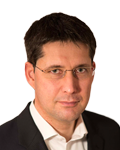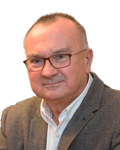09
Oct
2019
18:00
BST
Webinar
New Stroke Outcomes Data: The Role of Prolonged Cardiac Monitoring in Secondary Stroke Prevention
-
Views:
 401
401
-
Likes:
 0
0
Overview
It is well-studied that the AF detection rate in cryptogenic stroke patients is up to 30%1. AF-patients have an increased ischaemic stroke risk2, and oral anticoagulants decrease the stroke risk in those patients.3
However, until recently, outcome data hadn’t been reported but in June 2019, Prof Georgios Tsivgoulis et al. published new data which showed that prolonged cardiac monitoring has a significant impact on secondary stroke prevention.4
Prof Wolfram Döhner (Charité - Universitätsmedizin, Berlin, DE) will moderate this live webinar discussion between Prof Georgios Tsivgoulis (National & Kapodistrian University of Athens, GR) and Prof Robert Hatala (National Cardiovascular Institute and Slovak Medical University, SK) on this new research.
Faculty:

Wolfram Döhner

Georgios Tsivgoulis

Robert Hatala
This webinar is supported by

Key Learning Objectives
- New evidence about the connection between atrial fibrillation and stroke.
- Incidence and impact of atrial fibrillation on cryptogenic stroke patients.
- Effects of prolonged cardiac monitoring on AF-detection yield, anticoagulation initiation, and recurrent stroke rate.
- The importance of a multidisciplinary approach to successfully find a diagnosis in stroke patients.
Target Audience
- General cardiologists seeing stroke patients.
- Cardiologists/electrophysiologists involved in cardiac monitoring with insertable cardiac monitors.
- Stroke specialists such as neurologists, geriatricians, and other healthcare professionals working with stroke patients.
- Allied healthcare professionals such as physiologists, hospital technicians or nurses involved in cardiac monitoring.
Faculty Biographies

Wolfram Döhner
Prof Wolfram Döhner M.D., Ph.D., FESC is Professor of Interdisciplinary Stroke Research at the Charité - Universitätsmedizin Berlin, Germany. He is a cardiologist and specialist for internal and nutritional medicine. He works at the Center for Stroke Research Berlin (CSB) and the Dept of Cardiology at the Virchow Hospital of the Charité. Prof Döhner was Chair (2016-2018) of the study group on heart and brain interaction for the HFA and Secretary for the rehabilitation section for the European Association on Preventive Cardiology (EAPC). He is a member of the ESC program committee (2014-2020) and is Chairman (2018-2020) of the ESC Council on Stroke.

Georgios Tsivgoulis
Prof Georgios Tsivgoulis M.D., Ph.D., MSc, FESO, FEAN is Professor of Neurology and Vice-Chairman in the Department of Neurology at the National & Kapodistrian University of Athens, School of Medicine in Greece. He is the Divisional Director of Cerebrovascular Diseases, Director of the Neurosonology Laboratory and Director of Residential Training and the Cerebrovascular Fellowship Program. He is also a Visiting Professor of Neurology and Director of Stroke Research, in the Department of Neurology, University of Tennessee Health Science Center in Memphis, TN. His research interests focus on acute reperfusion therapies in acute ischaemic stroke, applications of neurosonology in cerebrovascular diseases, secondary stroke prevention, and clinical trial methodology. Prof Tsivgoulis serves on the board of Directors for the European Stroke Organization (ESO) and is the Chair of the International Liaison Committee (ESO). Prof Tsivgoulis has published more than 300 original papers and 11 chapters in international medical journals in the field of cerebrovascular diseases.

Robert Hatala
Prof Robert Hatala PhD, FESC, FACC, is head of the Department of Cardiology and Angiology and Director of the Arrhythmia and Pacing Centre at the National Cardiovascular Institute and Slovak Medical University in Bratislava, Slovakia. He obtained his MD degree at Comenius University, Bratislava and practiced several years abroad in both Canada and Europe. His main areas of interest are: catheter ablation in adults and children, atrial fibrillation, sudden cardiac death and heart failure. In 1995, he founded the first specialised arrhythmia center in Slovakia with more than 2,000 interventions annually and has extensive experience with implantable loop recorders.
Key References
1. Sanna T, Diener HC, Passman RS, et al. Cryptogenic stroke and underlying atrial fibrillation. NEJM 2014;370(26):2478-2486.
https://www.nejm.org/doi/full/10.1056/NEJMoa1313600
2. Wolf PA, Abbott RD, Kannel WB. Atrial fibrillation: a major contributor to stroke in the elderly. The Framingham Study. Arch Intern Med 1987;147(9):1561-1564.
https://jamanetwork.com/journals/jamainternalmedicine/article-abstract/608730
3. Stroke Prevention in Atrial Fibrillation Study. Final results. Circulation 1991;84(2):527-539.
https://www.ahajournals.org/doi/abs/10.1161/01.CIR.84.2.527
4. Tsivgoulis G, Katsanos AH, Grory BM, et al. Prolonged Cardiac Rhythm Monitoring and Secondary Stroke Prevention in Patients With Cryptogenic Cerebral Ischemia. Stroke. Published online June 20, 2019.
https://www.ahajournals.org/doi/abs/10.1161/STROKEAHA.119.025169





